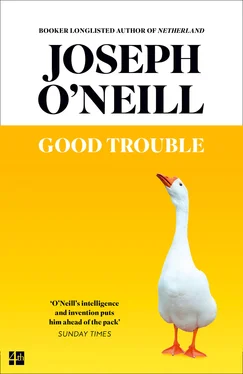Norton Anthology and for the first time came truly face-to-face with a poem’s mysterious verb-visage. He still remembered the one that did it for him—Roethke’s “The Waking,” funnily enough.
So take the lively air, / And, lovely, learn by going where to go, he recited to Liz. And that was the moment he’d set off on a delightful clueless journey in language, and for years he never once felt lonely or even singular, because at all times he felt this breeze, he said to Liz, on which the poems he would read and write might be accepted and held firmly aloft, and the air of the culture seemed filled with such breezes and such poems. Yes, Liz said, I know exactly what you mean. Frank O’Hara did it for me, she said. Which one? Mark asked. Liz said, “Animals,” to which Mark replied,
We didn’t need speedometers / we could manage cocktails out of ice and water, and Liz wanted to hug her friend. Anyhow, Mark continued, the damn thing is, it’s so hard to keep believing. And there’s so much you need to believe in. Does that make sense to you? It does, Liz said. Mark said, You become aware that what you’re doing is almost nothing. That it’s just a few atoms away from nothing. And now, with this scandal, I feel that what we do is in fact nothing. I feel like it’s officially nothing. Liz saw that Mark had other things he’d planned to say but was too emotional to speak. Liz, they’re calling him a poet, he finally got out. You know? They’re not calling him a novelist. They’re not calling him a songwriter. They’re saying he’s a poet, Liz. I know, sweetie, Liz had said.
“Seems like he’s finally accepted the honor,” she now stated.
Mark said, “Of course he accepted it. A guy with that much vanity? He was always going to accept it.”
He didn’t tell Liz that, during the couple of weeks that Dylan had not responded to the news of his award, Mark had hoped that the singer would tell the Swedish buffoons where to stick it; that Bob had the integrity to recognize that an ultra-celebrated multimillionaire who deals in concerts and extra-paginal iconicity is not playing the same game as a writer who sits down in a small college town and, with no prospect of meaningful financial reward, tries to come up with a handful of words that will, unless something untoward should happen, be read by a maximum of a hundred and forty people and be properly appreciated by maybe fifty-two of these, of whom maybe six will be influenced. Make that two. Once a year a small beam of honor, reflected all the way from Stockholm, faintly brightened the dim endeavors of such writers. And now even this glimmer had been removed from their small and dark corner of the sky and tossed like a trinket into Bob Dylan’s personal constellation.
This sidereal imagery made Mark uneasy—stars were almost always cheesy; doubly cheesy, in the context of a “pop star”—but he had nothing else. Language was hard. And poetry, he’d always felt, was language at its hardest.
He had recently expressed this point of view to his friend Jarvis, a writer of short-form fiction. Jarvis said, “Really? Poetry is hard, sure. But good prose is just as hard, man.”
“Poets can generally do what prose writers do,” Mark, a little drunk, declared. “The reverse? Not so much.”
A day later, he received an e-mail from Jarvis with a poem attached:
Easy Peasy
It seems that what’s
Keeping what is as it is, the whole thing thing, is physics, whatever
That is. Let’s see: the fizz of the river, l’hiver, that Swiss
Watch thing. Liver.
Every frisson, everything that’s
Alive or that was once aliver. The leaf. The leaver.
He forwarded it to Liz:
What do you think?
She wrote back:
So great that you’re writing again! This is good—best thing you’ve done in a while. So effortless. “Physics” and “fizz” is a pleasure. And don’t think I haven’t noticed that the English-language contractions erase “i” and “u.” In a poem drowning in materialism, that’s just such a smart, playful way to raise the issue of subjectivity.
Mark didn’t get back to Liz. Or to Jarvis.
Re the Dylan Nobel, Liz said, “It’s depressing. I can’t separate it from the Trump phenomenon.”
The election was a week away.
“Yes,” Mark said. “And hypercapitalism, too. The reader as consumer. It’s an interesting question.”
He kept secret, even from Liz, the fact that he’d already written on this question. It was a secret because what he’d written wasn’t a poem. For some months, Mark had worked surreptitiously, and exclusively, on a series of prose reflections that he termed “pensées.”
How doable pensées were! The most difficult thing about making a poem, in Mark’s judgment, was figuring out the text’s relation to its own knowledge; figuring out, to quote from Liz’s one anthologized work, the poem’s “claim to saying.” There was no such problem with a pensée: you wrote as a know-all. Apparently—and here, Nietzsche and Cioran and above all Adorno were Mark’s masters—the trick was to simply put to one side all epistemological difficulties and just steam ahead into the realm of assertion and opinion and emphasis. Boy, it felt good. With great gusto Mark had knocked out, apropos of the hypercapitalistic reader:
As class-based submissiveness justly evaporates, appropriate deference —to expertise, rationality, and even data—also disappears.
This results from a state of affairs in which one’s autonomy consists primarily in a freedom to consume. Objective realities are inspected like supermarket apples and accepted only if they tickle the fancy. If they don’t, it’s not sufficient merely to reject the apple. The apple tree itself must be cut down. And then the orchard. Hell hath no fury like a consumer inconvenienced.
In this way, shopping is confused with resistance; a bogus egalitarianism prevails; a vicious man-on-the-streetism becomes dominant. The tricoteuses make their return, clicking not needles but touchpads. Need one add that the poem is the first to be dragged to the guillotine?
Who knew that writing this stuff would be such fun? The voice—at once pedantic and forceful, and strangely aged and pampered—was the most fun of all. It was the voice of the short-tempered Central European professor whose wife’s principal domestic project is to ensure that her husband enjoys peace and quiet in his study.
Mark had not had a wife or a study in six years. Liz and he became close during the chaos of his divorce, when he was outed as a cuckold and outed from his house. His male friends, he was a little shocked to learn, were ineffectual, indiscreet, and bizarrely merciless confidants. Liz listened to him sympathetically—and honestly, too. When Mark said to her, I was blindsided, Liz said, Yeah, maybe, and he said, What do you mean, maybe? and Liz said, Quarterbacks are blindsided. You weren’t blindsided. You were myopic.
Liz’s criticism of Mark’s poetry was similarly sensitive and forthright, and he was very grateful for it and happy to reciprocate. Her work wasn’t right up his alley—it was a little too academic and sexual—but there was no querying its intelligence and carefulness. In any case, Mark mistrusted his own alley, which at this point, as he’d once remarked to Liz, was overrun by the rats of resentment. And the cats of confusion, Liz suggested. Not to mention the dogs of disillusionment.
If Mark envied Liz at all, it was for the growing kudos that E. W. West enjoyed as a writer who disturbed edifices of gender and sexuality. But it wasn’t Liz’s fault that her biologically and culturally determined homoerotic inclinations were now in vogue, just as it could hardly be held against her that she’d grown up in bourgeois luxury on the Upper West Side of Manhattan. (Liz often complained to Mark about finding herself in Virginia, a dislocation that she experienced, as any reader of her “Sappho in Sicily” quickly grasped, as an exile.) Nor did he hold it against Liz that, in an unpublicized complication of her biographical profile, she was for the first time romantically involved with a man. His name was Pickett, apparently as a tribute to Wilson Pickett. Did anyone call their children after poets anymore? Mark doubted that there’d ever be a kid named McCain out there in the world. Or, if there would, the kid would certainly be named for the political weasel John McCain. Mark had long felt defamed by this echo.
Читать дальше












